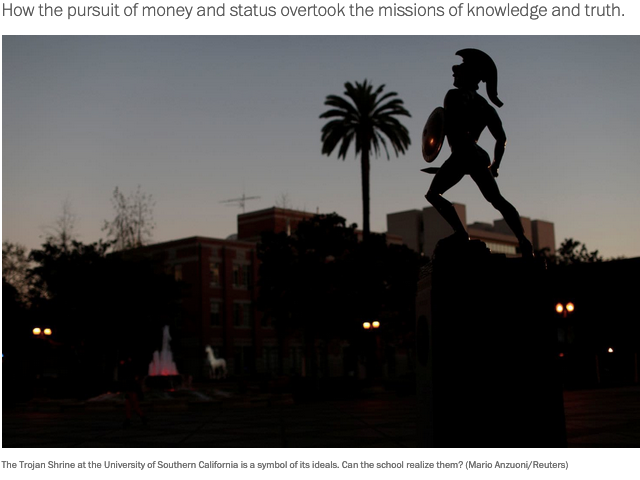The scandal around rich people buying college admissions for their underqualified children is disgusting and disheartening for everyone, but especially for those of us who teach and study at universities. My own University of Southern California is described as the “epicenter” of a crisis involving bribes in the hundreds of thousands of dollars. While it is tempting to say that the scandal involves only nefarious individuals, and that we can address the problem with a fine tuning of the bureaucracy, the problem is much deeper. There is an illness in higher education, and its name is corruption.
Corruption, in its most effective version, is an open secret — the “old boys’ club,” the “smoke-filled room” or the “network.” We accept that this is the way things are, until a brazenly illegal act of corruption exposes the status quo of legalized corruption. This is what has happened with the bribery scandal, which is only a symptom of an illness that has grown deeper and more pervasive over the past few decades in academia. Treating the symptom without understanding the illness will cure nothing.
Universities are noble enterprises built on the basis of the pursuit of truth and knowledge. But like all of our most noble enterprises, universities can be undermined by our own weaknesses, our susceptibility to temptation. In this case, the temptation comes from too much money and its attendant pathologies: greed, power, status and celebrity. I am proud to be a professor at USC, where the faculty and students are impressive, competitive and ambitious — and where the school has made efforts to work with the local community, providing admissions for neighborhood students and committing to socioeconomic diversity among its students. But USC is also close to Hollywood and the celebrity culture captured by one of the students, an Instagram “influencer” with 1.3 million followers, ensnared by the Varsity Blues scandal. (She had said online that she found school boring and looked forward only to the football games and the parties, suggesting that to her and other elite students, universities are merely finishing schools and vanity projects.)




